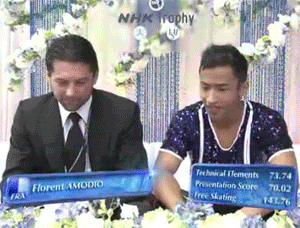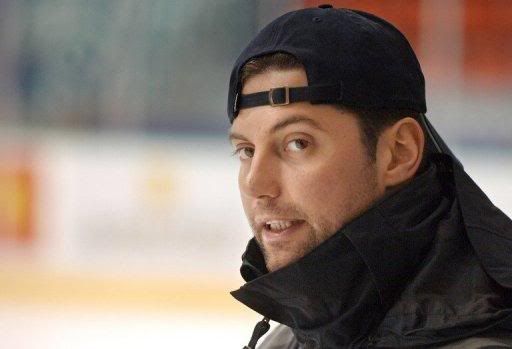Viņam vajag savu tēmu jau vien tāpēc, ka viņš trenē savus slidotājus Daugavpilī. Turplāt viņa pasparnē ir divi man ļoti mīļi slidotāji. Viņš ir daudz fantastisku programmu autors - piemēram Yagutina Žiemas".
Sākam ar nesenu interviju, kur viņš izceļ Amodio izvēles programmu šai sezonai, kā šīs sezonas labāko un saka, ka ir apsurds, ka Patriks Čans ar diviem kritieniem uzvarēja Kanādas GP posmā.
Nikolai Morozov:
"Working with the Japanese is very difficult"
Interview with Morozov after CoR - I put this together through 2 online translators and tried to make it make a bit more sense, some bits are still a bit incomprehensible and I'm sorry for any mistakes!


How would the country in which neither evolved career Nikolai Morozov, he constantly draws attention to himself. In coaching track record - Shizuka Arakawa, the Olympic Champion in Turin, the World Championship Gold dancers Shae-Lynn Bourne and Victor Kraatz in 2001, and Miki Ando in 2007. Among his outstanding choreographic achievements are "Winter" by Alexei Yagudin, "Dark Eyes" Sasha Cohen, "Hip Hop" Daisuke Takahashi, and "City Lights" Nobunari Oda. At the time, he surprised many that he separated from Takahashi without any regret after the student had become the world championship silver medalist, and at the end of last season stopped working with Oda. He decided to move from America to Russia and settled in Daugavpils, Latvia. He's taken Miki Ando to the final of the current "Grand Prix" with the best women's result, but does not hide at the same time that he thinks the most successful programs he has created this season was not for her, but for his French disciple Florent Amodio, who is not even in the top ten in Europe.
The victory at the stage of the Grand Prix in Moscow dalas Ando and Morozov exertion. After arrival in the capital when the entire group of Russian specialists are ready for competition, training at the stadium, "Moskvich", a Japanese skater collided with 18-year-old boy, seriously injuring her back. After the short program, she was in fifth place, and it was unclear whether Ando will be able to continue with her performance ...
- "Well, now need to urgently change plans and fly to Japan. I'm totally not counting on the fact that Miki will get to the Grand Prix final" - the first thing Morozov said when we started talking.
- A year ago we were in this same hallway talking, about men's figure skating and how it will be at the Olympics in Vancouver. Back then, it appeared to be that you did not think Plushenko would fail. And what would you say now about his Olympic defeat?
- What he really was not supposed to lose. Overall, everything was fair enough, but in the short program, Zhenya was, in my opinion, sold a little short. Discussing figure skating from the perspective of "who is the best skater" has no meaning. Plushenko has one style, with Evan Lysacek - quite different. Each, accordingly, has its advantages. But do not forget that in Vancouver Plushenko twice jumped quads. First, in the short program, then - in the arbitrary. This jump takes a lot of strength. That's why I said can accept the fact that Plushenko lost the gold medal, but I will never agree with the assessment of the short program. To go to the Olympics to jump quads, one must possess great courage. This is a very special level of risk.
- When it turns out that when another skaters wins a tournament who has not mastered the quad jump, does it annoy you as a coach?
- No, in figure skating this happened quite a few times. Now, by the way, with a change in the scoring rules regarding jumps the situation in men's figure skating has changed. At each stage of the Grand Prix of the season, there were a few people who tried to jump quads. If the jump is fully rotated, it brings a lot of points even when the figure skater falls. As it turned out on stage in Moscow with my sathlete Javier Fernandez, for example. He performed was an unsuccessful quad, earning 7.73, which is more than a well-done triple lutz is worth.
- What are your understanding of what should be in "a good program"?
- It surely must be built on a set of specific things: slide, steps, movements on the site, the music ... You can no longer focus only on jumps, or just to work the legs. And after all that, and other extreme in the men's figure skating, we have seen repeatedly. Moreover, Takahashi was the case, set for components 8,5, given that over the long program, he fell seven times. It is abnormal, when Patrick Chan without any work wins tournament, having fallen three times as it was at the Grand Prix in Canada.
- Under reports of competitions of this year I have noticed, that the overwhelming majority of man's programs began to be under construction on the certain pattern - with five jump elements in second half of program.
- Well, yes. Those who are more intelligent, based on the fact that such a program could bring more points, and immediately begin to think about how you have to train to get it all "vykatat". But enough of those who puts jumping into the second half just because others do so. Who will be able to do it or not - that's how it goes.
- And how do you have to train to all "vykatat"? This requires that the skater has some special qualities?
- No, it just takes longer. It is not important task, incidentally. Alexei Yagudin at the time jumped five triple in the second half of the program, given that he had to roll the program sometimes five in the morning.
- But there was another example: all the time, that there is a new system, the same Plushenko tried to run the vast majority of jumps at the beginning of the program, because otherwise he was not strong enough to bring performance to the end without losing speed.
- I am sure that if Zhenya had originally set himself the task of jumping in Vancouver five jumps in the second half of the program, he would have jumped them. Another thing is that he had not much time to prepare for the Games. So, I think he did not want to take too many risks.
*
- Answering questions from reporters in the mixed zone, you said that you are not interested in preparing an athlete who is only aiming to get into the top ten at the world championships ...
- I shall explain, that I meant: repeatedly I saw how the Russian sportsman takes, say, the tenth place, that, naturally, is not any outstanding achievement, but he is absolutely happy, that he has won against other Russian sportsman. This is to me is absolutely uninteresting. I would like that my figure skaters think not of competing among themselves, and are capable to struggle for medals.
- How many athletes are in your group?
- Four boys and two girls.
- And a Japanese dancing couple?
- Yes. I do love working with dancers. As I was an ice dancer when I was younger.
- Not so long ago I read a statement by the Japanese choreographer that in Japan there is almost no likelihood of strong ice dancing team by the fact that the traditions of national culture has never encouraged public displays of affection between a man and a woman.
- So, what you said, of course, has an effect, but as in all sporting matters, the Japanese quickly learned to strive for results. If they believe dance will bring victory and medals, immediately it becomes very popular, no matter what the tradition. Just as figure skating quickly became wildly popular in general.
- After Shizuka Arakawa's victory at the Olympic Games in Turin, the emergence in Japan of talented young skaters like an epidemic. But for this there should be enough outstanding coaches, traditions and schools. Where do they come in so quickly?
- Due to the parental fanaticism, oddly enough. Parents watch all the competitions on television with a sophisticated understanding what they saw, transfer it to ice, coaching their own children ... The funniest of the national championships, where I've visited, it's the Japanese.
- Why?
- Because only there you can see an athlete who, for example, does a fine triple axel jump, but do not have a clue how to jump a triple toe loop. This is roughly the same as that to be able to eat with a fork, but to not know why there is a spoon.
***
- A year ago Daisuke Takahashi left your group, but Oda remained. After a bad performance at the world championships in Turin, Oda also went to another coach. Why?
- This was our mutual decision - to leave. I've already told you: to work with the Japanese is very difficult.
- I thought you like it to be challenging?
- I like when it comes to athletes. But not for those around them. I, for example, create an athlete's training plan, leaving it for a month and, once back, it turns out that this entire month, he was engaged in general physical training, because the Japanese Federation of figure skating decided that he should.
Despite the fact that Oda and I parted, we have kept a great relationship. The hardest part of working with Japanese athletes - to ensure that they have begun to be frank with you. In Vancouver, Nobu came to me the day before the Olympics and almost in tears said that he'd recieved a phone call from Japan, his girlfriend, saying she was pregnant. Naturally, I began to say that a child - it's great. And that he does not need to cry, and to rejoice. He fell into a stupor, having lost the ability to think about something else. Because he was thinking about the girl, naturally, about the future child, his mother did not know and we had to somehow tell her about it. Here Nobunari and puzzled how to do it, not to "lose face" and not to offend his mother. Because the relationship between parents and children in Japan - a very special and very complex topic.
As a result of these experiences Oda had completely forgotten that we need to train, tune into the fight. And then, after an unsuccessful performance, he began to aspire to that at all costs to show the world that the failure was accidental. With these thoughts he came to the World Championship in Turin but again lost everything.
- Among the huge number of programs you have created there are always some that are remembered especially.
- I know. This season for me was a free program for Florent Amodio, which, in my opinion is tenfold more expressive, than Takahashi's "Hip Hop". I think that this is the best there is today in the men's figure skating with a choreographic point of view.
- Judging by the fact that the best program is not fot your core athlete Miki Ando, and enough neraskruchennomu skater, manage the process of creating outstanding programs you are not able?
- You're right. Such programs appear as if by themselves. There should be a number of things coming together: good music, mood, the capabilites of an athlete at a time when you offer the music to them. Ando - she is an athlete whos strength is in jumping. Therefore, the selection of music for her competitive programs is somewhat limited. But I gave her this season very interesting exhibition programs. Did it on purpose - to show in Japan, Miki often skates in the shows, to demonstrate that she is no worse than Arakawa. And in many respects much superior to her.
In competitive for now Ando not a good time - due to a back injury.
- That she got in a collision with Abzalov Rakimgalievym in Moscow?
- Yes. That, incidentally, is another example of the Japanese self-restraint: I saw that Miki was terribly hurt, that her back is constantly worried her, resting between workouts she can not find a comfortable position, but she did not show her feelings, did not complain, was not capricious. Silent all day, clenching her teeth. It was only late in the evening she blurted: "I do not like Abzal."
*
- When creating a program do you have to keep in mind with whom the athletes compete, how and what can be done to "outdo" competitors even before they begin to compete with him?
- About such things I never thought of. I create the program as I see it in relation to one or another skater. I try to provide all the details, to arrange the elements so that the person can above all skate it comfortably.
- Who in this regard has been the hardest work?
- From Oda - in the "Lights Big City". Nobunari in nature - an athlete of clean water. He always wanted to move forward in terms of complexity, speed, fancy stepping paths, and it was absolutely not care about the image. Sometimes I have a feeling that the term "appeal to the public" was absent from his mind. This, I would say the general problem of Japanese athletes. Hence the problem: to jump into the program, two triple axel or two stages of 3 3, or something else. The only person to whom I was able to fully convey the need for artistic expression, was Takahashi. So long as he remains the only Japanese skater, who is capable of getting a PCS of more than 8.5 points.
Work with Japanese boys also difficult because they are rarely distinguished by some outstanding external data. When an athlete is beautiful to him that neither the set - all looks good. Although every day of the program should be changed.
- Do you already have a clear idea of your permanent place for further work?
- No. Until now, we're all ready for the season in Latvia. Now I'm going to Japan, where especially for Miki's mother and agent, we've organized a training camp to prepare for the final Grand Prix. " But what will happen until you want to think. In America, I left a daughter, so naturally I don't want to completely break links with that country. Now comes my daughter is coming with me to Paris for the final Grand Prix, where Amodio will skate.
- I heard that in the U.S. you had magnificent facilties for your work.
- Yes, thats true.
- So why did you leave?
- I do not know. The idea of returning to Russia was born at the Games in Vancouver. I was asked about it by quite influential people. And I thought: "Why, indeed, no?" In the end everything I could do by working outside the country, I have already done.

